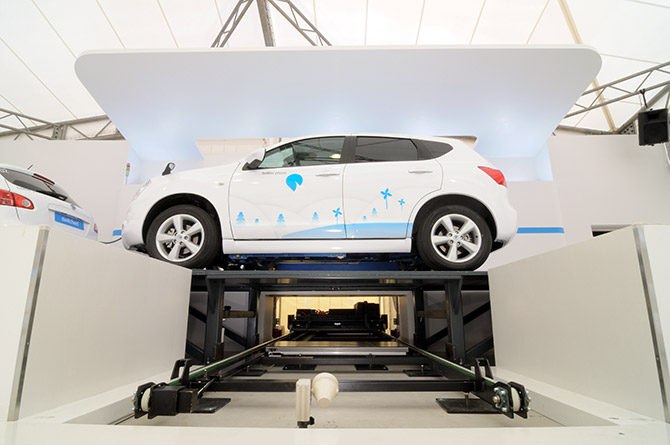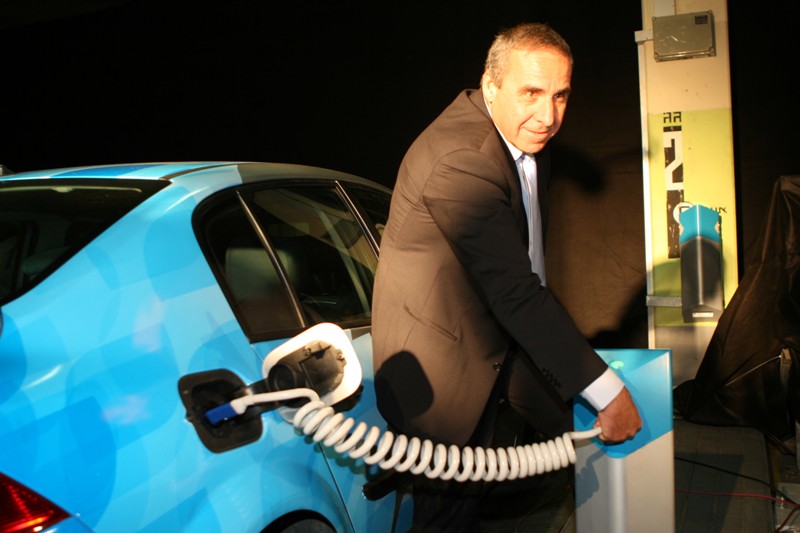Driving a mile on electricity always costs less than using gasoline for the same mile. Now Better Place, the consortium wiring Israel with electric-car recharging stations and battery quick-swap facilities, has upped the ante: They claim their electric cars will cost $4,500 to $7,500 less than gasoline cars.
It's an audacious statement, even if they're fudging on two counts.
No pack, government aid
First, the price they're citing is for a fully electric car--initially a 2011 Renault Fluence EV sedan--minus the lithium-ion battery pack that gives it 100 miles of range, which could cost as much as $15,000. So you're getting a simpler car (one electric motor, no engine, no transmission) without its most costly component.
Second, as Better Place founder and CEO Shai Agassi told German magazine Auto Motor und Sport, "Governments give incentives for electronic vehicles, that's how we can sell the car at cheaper prices." In the U.S., for example, a tax credit from $2,500 to $7,500 (depending on battery-pack size) is available to buyers of the first 60,000 electric-drive cars from any manufacturer.

Better Place battery-swap demonstration

better place battery switch station 007

better place battery switch station 003

Better Place Israel CEO Moshe Kaplinsky displays the first electric parking lot in Israel.
Like cell-phone plans for driving
The drivers who are Better Place customers won't own the pack; they'll simply pay for the miles they drive, which includes the electricity, use of the battery pack, and access to the charging stations and quick-swap facilities. Ownership of the pack remains with Better Place, which will offer a range of pricing plans akin to mobile-phone service plans.
One plan, at $375 a month, permits up to 18,000 miles a year. That's competitive with the price of gasoline (though no cheaper) if you assume a 30-MPG car and gasoline that costs $7.50 per gallon, which is realistic for Israel.
Unlimited annual mileage will cost $500 or a bit more. Which, as Agassi points out, is a deal you won't get from your local oil company. Still, at least in the beginning, those miles probably have to be covered within the boundaries of Israel.
[UPDATE: We were subsequently contacted by Julie Mullins of Better Place with a clarification: Those pricing numbers were hypothetical scenarios used to show that different mileage plans would be available for different driving needs. She attributes the confusion to the original interview having been translated from the German, meaning some of the semantics may have been lost.]
Sure it works at $7.50 a gallon, but...
In the U.S., however, with gasoline ranging from $2.50 to $4.00 a gallon, the payback isn't so clear. Sure, the energy to drive one mile in an electric car charged on wall current will run you 2 to 3 cents in most areas, versus anywhere from 5 cents (in a 2010 Toyota Prius, at $2.50 a gallon) to, say, 40 cents (in a 10-MPG supercar, at $4/gallon).
But amortizing the cost of the pack is a tough nut to crack, at least until there's real data on how long a lithium-ion automotive battery pack will really last, how much energy is left after 5, 10, or 15 years, and whether a secondary market for used packs develops.
First car: Renault Fluence EV
Better Place expects to provide a range of vehicles, but its first will be from French carmaker Renault. Among the four Renault concept cars at the Frankfurt Motor Show was the Fluence ZE concept, a close-to-production version of the electric sedan Better Place will offer first.
This is the car designed to permit a 90-second automated quick swap of its battery pack, which Renault calls Quickdrop, giving unlimited range (in theory) in any region outfitted with Better Place charging stations and quick-swap facilities.
Renault is using electric-car platforms and battery packs from its alliance partner, Nissan. That company will launch the 2012 Nissan Leaf electric hatchback in the U.S. with the same 100-mile range as the Fluence EV, but without the battery swap capability.
[Reuters]













